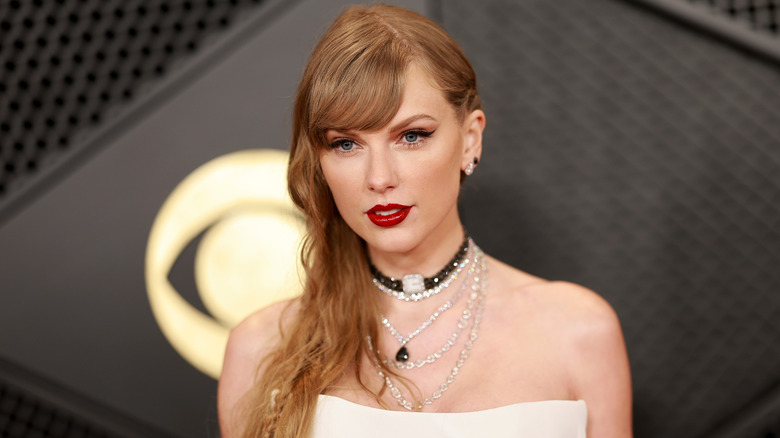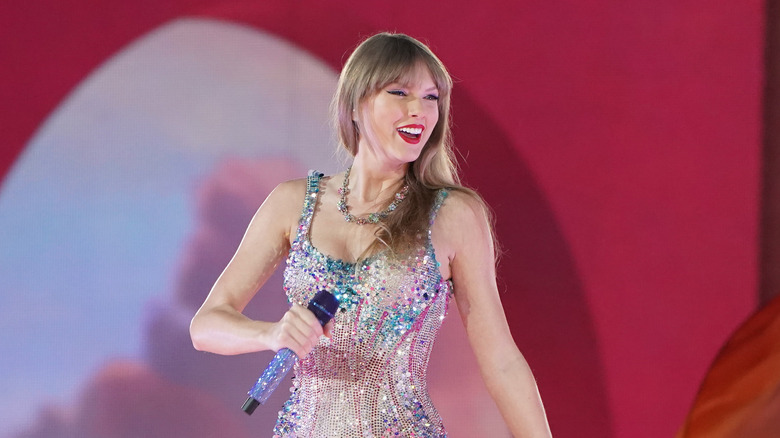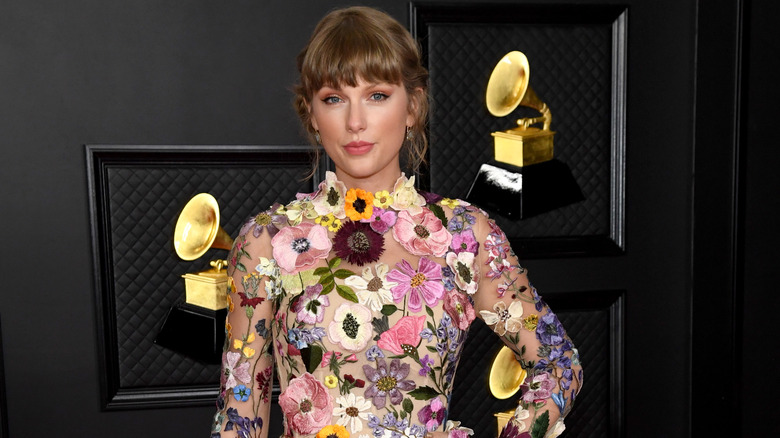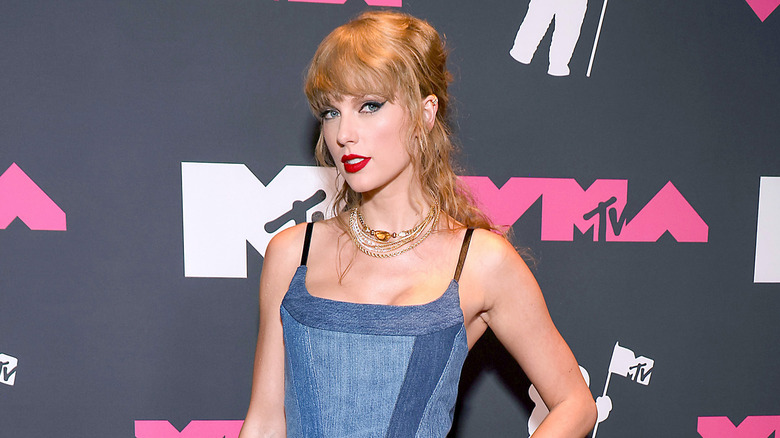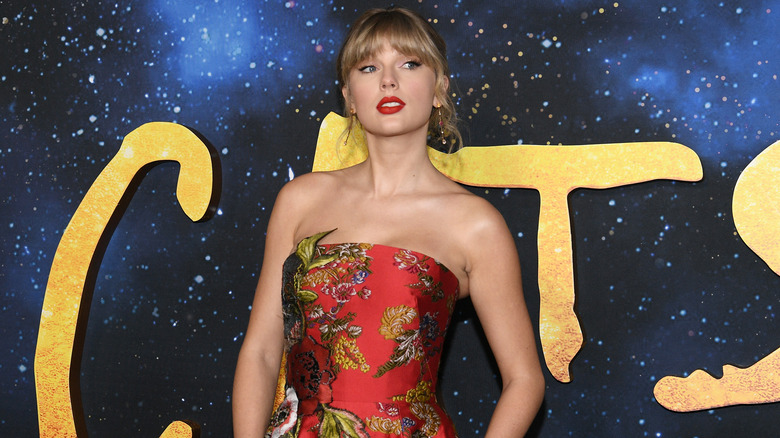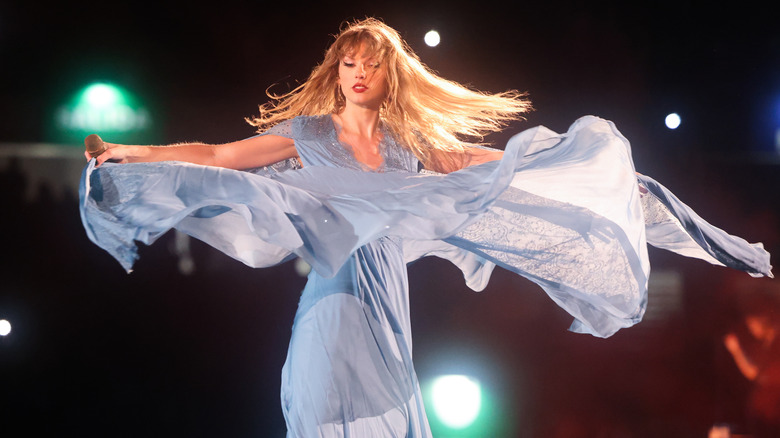Get Into Your Tortured Poets Era By Reading The Books Taylor Swift Has Referenced In Her Lyrics
When Taylor Swift announced her new album "The Tortured Poets Society" on February 4, fans started going crazy looking for Easter Eggs of what the album could be about. Going just by the title, we're expecting some deep, emotional lyrics and potentially some references to other literary works. Add in song titles like "But Daddy I Love Him" and the bonus track "The Manuscript," plus all the super artsy black-and-white album art, how could we not?
Swift loves books and has quite a way with words herself, too. Heck, she's even been compared to William Shakespeare. "Listening to her lyrics, which most of the rapturous (mainly female) audience seemed to know by heart, I came away with confirmation of a thought I first had 15 years ago: this isn't just high-class showbiz, Taylor Swift is a real poet," former Shakespeare professor at Britain's Warwick University, Sir Jonathan Bate, told Independent. He even claimed that Swift could "[rewrite Shakespeare's] darker moments" to ensure they're "more palatable" for a modern audience. Now that's quite the compliment!
As we head into our Tortured Poets era, there's only one thing we can do to prepare: Get reading for inspiration to become tortured poets in our own right. Or, at least get into the same headspace as the woman everyone's watching right now. To do that, we've rounded up some of Swift's most prominent literary references in her back catalog.
The Great Gatsby by F. Scott Fitzgerald
F. Scott Fitzgerald released "The Great Gatsby" back in 1925, and it appears to have inspired a few of Taylor Swift's tracks. Among them, "Reputation's" "Don't Blame Me" and "This Is Why We Can't Have Nice Things," as well as "Evermore's" "Happiness."
On "This Is Why We Can't Have Nice Things" — widely assumed to be about her drama with Kanye West and Kim Kardashian — Swift sings about feeling like she's in the novel before things came crashing down. "And there are no rules when you show up here/Bass beat rattling the chandelier/Feelin' so Gatsby for that whole year," she shared. In the lyrics for "Don't Blame Me," Swift appears to reference herself as Jay Gatsby's love, Daisy Buchanan. "I once was poison ivy/But now, I'm your Daisy," she sings.
In "Happiness," she makes some subtle references to the novel in a few lines. "I hope she'll be a beautiful fool/Who takes my spot next to you," she sings, with "beautiful little fool" being said in the book by Daisy. Swift also appeared to make a reference in the line "Tell me, when did your winning smile/Begin to look like a smirk?" as Gatsby's smile is referenced in the book. There's also one even more glaring reference. "All you want from me now is the green light of forgiveness," Swift sings, which relates to the green light at the end of the dock which symbolizes Gatsby's love for Daisy.
The Scarlet Letter by Nathaniel Hawthorne
One of Taylor Swift's most obvious book nods in her music comes in "New Romantics," taken from the album "1989." In it, she pretty explicitly references the book "The Scarlet Letter" by Nathaniel Hawthorne. Release in 1850, the novel is actually set in the 1600s and tells the story of a woman who falls pregnant with a man she's not married to. As a result, she is shunned and shamed. Her community even forces her to wear a red fabric letter A so that everyone can see her shame, as the letter stands for adulterer. The father of her child, though, for the majority of the story, sees no repercussions for his actions.
Swift, who's certainly no stranger to singing about love, references the iconic novel in one line in particular, singing, "We're all bored, we're all so tired of everything/We wait for trains that just aren't comin'/We show off our different scarlet letters/Trust me, mine is better." Swift appears to be referencing the constant spotlight on her dating life, and the way she's figuratively been made to wear a scarlet letter A following her breakups, due to the intense media attention and name-calling that's followed her relationships. All while her ex is all too often allowed to move on quietly. She even seems to reference all the talk about her dating life in the song, singing, "The rumors are terrible and cruel/But, honey, most of them are true."
Alice's Adventures in Wonderland by Lewis Caroll
A lot of people will probably know "Alice in Wonderland" best from the 1951 Disney movie (or the 2010 remake) but the original story was a book called "Alice's Adventures in Wonderland" by Lewis Carroll, released in 1865. It was this book that inspired Taylor Swift's "Wonderland," which was featured on the deluxe edition of "1989" (as well as "1989 (Taylor's Version)") and the "Evermore" track "Long Story Short."
For "Wonderland," there's the obvious reference to the novel in the title, but that's not the only connection. Just before the chorus hits, Swift sings, "Didn't you flash your green eyes at me?/Haven't you heard what becomes of curious minds?" which appears to reference Alice's curiosity which gets her into trouble. She also sings the line "And in the end, in Wonderland, we both went mad," as a reference to the Mad Hatter and Alice's subsequent distortion from reality. There also appears to be a reference to her ex being like The Cheshire Cat when she sings, "Didn't you calm my fears with a Cheshire Cat smile?" The Cheshire Cat is a character in the book who deceives Alice.
When it comes to the book reference in "Long Story Short," Swift likened falling in love with the wrong person to Alice falling down the rabbit hole. "And I fell from the pedestal/Right down the rabbit hole/Long story short, it was a bad time," she shared.
Rebecca by Daphne du Maurier
"Rebecca" marks one of the few times Taylor Swift has officially spoken out and confirmed one of her songs was inspired by a book. That song is "Tolerate It," taken from "Evermore." Written by Daphne du Maurier and released in 1938 (Swift sure does love an older book to influence her work) the book tells the story of a woman in an unhappy marriage. The main character, who does not actually have a name, marries a widowed man, only to find he can never truly love her because he's still too in love with Rebecca, his late wife. Instead of loving and supporting his new wife, he simply tolerates her.
Swift opened up about how the book inspired her while speaking to Zane Lowe on Apple Music in 2020. "I was thinking, 'Wow, her husband just tolerates her. She's doing all these things and she's trying so hard and she's trying to impress him, and he's just tolerating her the whole time. There was a part of me that was relating to that, because at some point in my life, I felt that way."
Swift makes numerous references to the story in the song, including the chorus. "If it's all in my head, tell me now/Tell me I've got it wrong somehow/I know my love should be celebrated/But you tolerate it," she croons.
All's Well That Ends Well, The Taming of The Shew, and Romeo and Juliette by William Shakespeare
Taylor Swift has also made a few references to the work of the late William Shakespeare. One of the more obvious has to be in the "Red" track "All Too Well," which appears to be a reference to the 1623 play "All's Well That Ends Well." The "Taylor's Version" of the song appears on the re-release of the album and features the lyrics, "They say all's well that ends well, but I'm in a new hell." The song itself is about a fizzled relationship and Swift is trying to work out what went wrong.
There's also a potential reference in "...Ready For It?" from "Reputation." In it, Swift notes she's become calmer since falling in love, singing, "I'm so very tame now/Never be the same now." And that may well be a reference to "The Taming of the Shrew" from the early 1590s.
Of course, one of the superstar's most famous literary references has to be in one of her biggest hits: the "Fearless" track "Love Story." The romantic mega-hit makes references to the iconic British playwright, explicitly linking to the 1597 play by describing herself as Juliette and her lover as Romeo. "You were Romeo, you were throwing pebbles/And my daddy said, 'Stay away from Juliet.'" The star also references the time period of the writing in the music video, sporting a period dress as she sings from a balcony.
